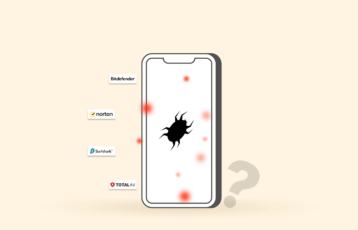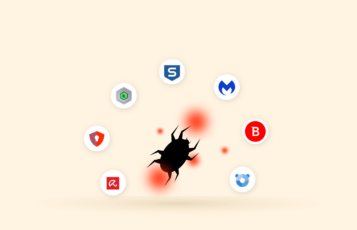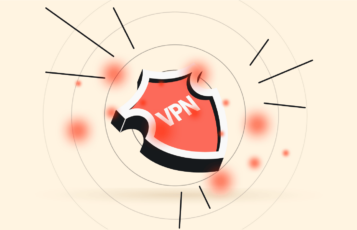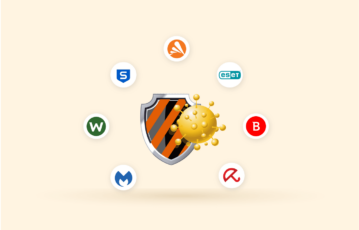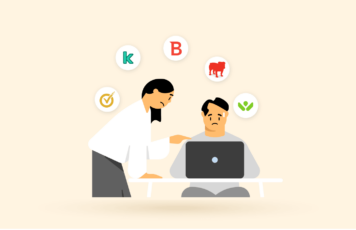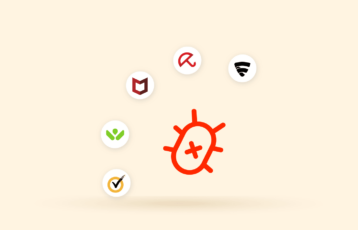iOS has the reputation of being the safest operating system on the market. However, it is not entirely immune to malware, so you must use reliable antivirus software.
Besides malware, your iOS device is vulnerable to malicious ads, phishing emails, and other online threats. Thankfully, having an antivirus on your iOS device can be a game-changer as it will safeguard you from known and zero-day threats.
Unfortunately, not all antivirus solutions can work on Apple devices. So, we tested each provider to ensure their products are tailored to run on your iOS operating system.
This article will show you the best “antivirus” apps for your iOS devices (iPads and iPhones). These are not virus scanners but security tools that offer many valuable features to enhance your online security. These features go from protection in public WiFi hotspots to integrated VPNs. So, let’s look at the best five security apps for iOS systems today.
Best iOS antivirus apps – The quick list
- Norton 360 – Has advanced protection features to keep you safe over the internet. It also has a dark web monitoring tool that notifies you when your personal information leaks.
- McAfee – Additional features to protect your videos and pictures behind a PIN code. Also, its premium version has an unlimited VPN.
- TotalAV – Comprehensive Antivirus solution with anti-phishing and VPN features. It also has additional features like a data breach checker, device locator, photo manager, and battery monitor.
- Bitdefender – Highly rated antimalware suite with an impressive virus detection record. Has a VPN that comes with a 200MB data cap.
- Avira – Incredible lightweight antivirus program with a VPN with a 100 MB data cap. It can boost your privacy by preventing Siri from logging your commands to Apple servers
Why do you need an Antivirus for your iPhone or iPad?
Let us tell you something the antivirus software industry doesn’t want you to know: you can’t scan an iOS device for viruses. No, you can’t, honestly. You see, iPads and iPhones have a security feature known as “sandboxing.” It’s called that because it allows every app to play only within its “sandbox.”
Everything is categorized that way, so no app on your device can change any other app, file, or process. And that’s why viruses can’t infect an iOS system. Even if they get inside, they can do nothing once they’re there.
So, what is the authentic meaning of a phrase like “iOS antivirus”? What it means is “internet security for iOS.” This notion refers to various features that keep iOS devices safe. That is necessary because, out of the box, this hardware is not protected against many online security threats. Those include:
- Device theft
- Browser trackers
- Data-stealing apps
- Unsafe public WiFi hotspots
- Phishing links
We swept the so-called “security” iOS universe. It took us dozens of hours to go through scam apps, useless apps (free and otherwise), and security apps in the App Store that won’t do the job. We sought software to deliver protection without hidden fees or fishy trial periods. Thankfully, we found five such apps – that’s the good news.
However, the so-so news is that no single free security app for iOS includes all the features you will need to keep your device safe. But, if you know your data and privacy are worth more than a modest monthly fee, you should look at Norton’s iOS app, which is nothing short of fantastic.
Picking the best antivirus app for iPhones
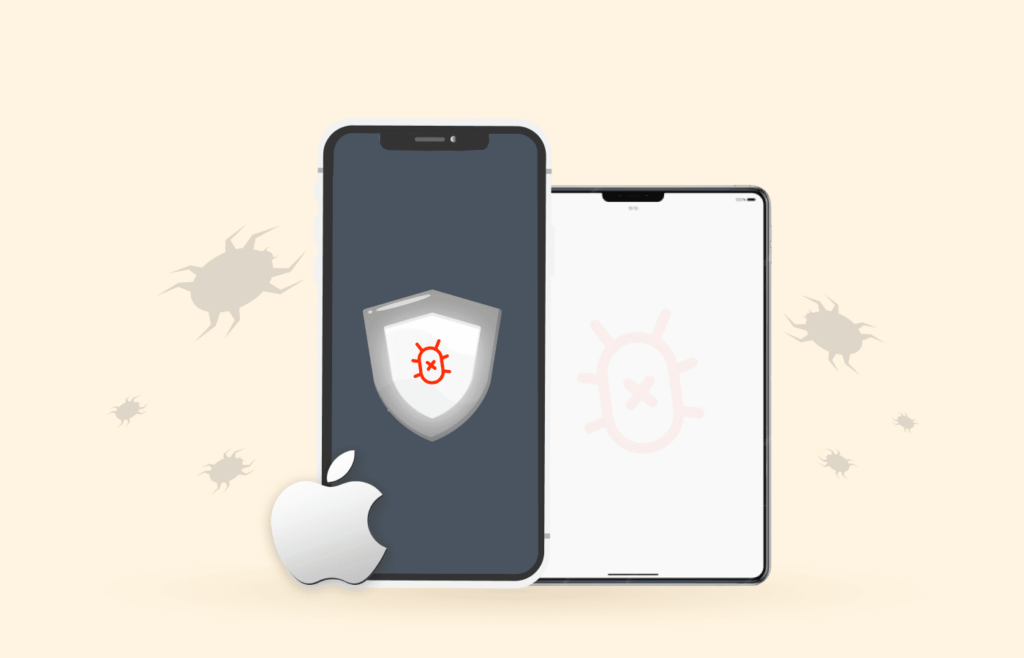
So you still can’t pick a winner? No problem. The five options are all excellent indeed. So, let us offer you a few extra points to consider when selecting the best app for your iPhone.
1. Pricing
Are you ready to pay for a license or a fee? Or do you think a free app should be enough for you? Of course, the most critical single factor with pricing is that the free apps won’t give you real-time protection.
As noted before, this is an essential feature. If you can’t have it, you’ll have to trust Apple’s built-in security policies and software –and if those were so good, why would you need an app anyway?
2. Additional features
Once you’ve made up your mind about paying or not, consider the features. For example, are you interested in file backups, data breach checkers, device locators, or VPNs? The VPN is always a good thing to have, in my opinion (but it’s also always better to have a premium VPN service like NordVPN), but maybe having your pictures protected doesn’t seem like that big a deal. So, see which app fits you best.
3. Data Privacy
Some free antivirus apps can harm your privacy as they log user data. Some paid apps may also do the same, but there are a few only. So before choosing one, ensure your antivirus provider does not log or sell user data and doesn’t meddle with your privacy.
4. Multi-device support
Last but not least, consider all your other hardware. Yes, we’re talking about iOS devices primarily here. Still, since these antivirus suites offer coverage for multiple devices for a single account, you should consider which provider will be more helpful if you have one or more computers running on Windows, for example.
Every option in our top five list also offers excellent antivirus protection for Windows (so you have other choices except Windows Defender now, too), Android, and macOS, so if you take that into account from the beginning, you will save yourself a bit of work and money down the line.
Top 5 antivirus apps for iPhone compared
| Norton 360 | McAfee | TotalAV | Bitdefender | Avira | |
|---|---|---|---|---|---|
| Features | spam text filter, web protection, Dark web monitoring, 14-day free trial | free version, battery monitoring, VPN, data breach checker | free version, battery monitoring, VPN, data breach checker | VPN, parental control, email scanner | VPN, Wi-Fi protection, automatic software updates, file backup |
| App store rating | 4.6 | 4.7 | 4.6 | 4.6 | 4.0 |
| Starting price | $19.99/year | $39.99/year | $19.00/year | $29.99/year | $30.99/year |
5 best antivirus for iPhone and iPad Today – The detailed list
1. Norton 360

Nobody rivals Norton in the security software industry for reputation and antiquity. It serves more than 20 million users worldwide. And that’s no surprise since this tool works well and keeps many people safe.
Let’s have a look at Norton’s offer for iOS devices.
Norton 360 is a very active tool that protects you in several ways. For example, it will filter out spam text messages that could include phishing links. Also, it will warn you about unsafe public Wi Fi networks. It also patches up a variety of vulnerabilities.
The Web Protection feature will keep you away from infected websites. And there’s also the Dark Web Monitoring tool that lets you know when your personal information has been leaked.
Additionally, this app enables you to use a VPN (but only if you live in the countries where it’s available).
There is no free version, and the fee will seem a bit steep for many users. But you can use its 14-day trial version before investing in this software.
So, the price may be high for the market, but it’s the best out there, and if you take your security seriously, investing in Norton 360 merits some serious thought.
2. McAfee
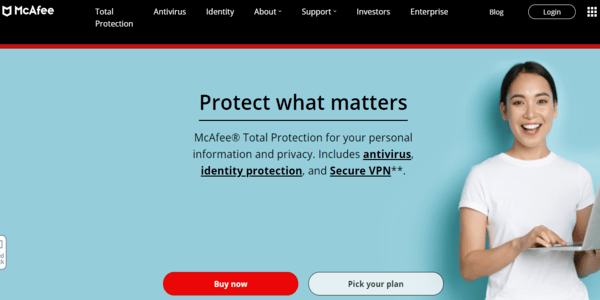
- Download: McAfee Security App Store link
If you were searching for the best all-around antivirus app for your iPad or iPhone, congratulations, you found it. It’s McAfee. It will give you some of the most fantastic security features in the market as it keeps your device safe.
So, after the glowing reviews for the first two options, how does McAffee shine? First, there’s the real-time protection feature. It will stop any incoming threats from getting inside your system. Then, it scans your system regularly to detect WiFi attacks and outdated software.
McAfee will track your device down, pinpoint its location using a GPS tracker, and activate a remote alarm if lost or stolen.
McAfee protects your pictures and videos with a PIN code and automatically backs up your contacts. And that’s just the free version.
If you sign up for McAfee’s Premium Plus version, you will also have at your disposal an unlimited VPN. It will secure your online activities even when you use your city’s leakiest, most surveilled Starbucks public WiFi hotspot.
You can try the Premium version for seven days before paying for a license. After that, you can cancel at any time.
3. TotalAV
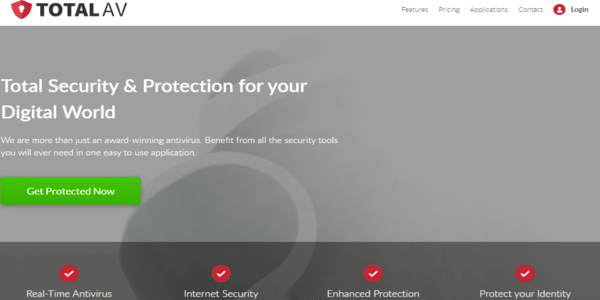
- Download: TotalAV App Store link
While TotalAV is not Norton360 or McAfee, it’s also at the top of iOS security and an excellent tool in terms of safety and features.
Unlike Norton360, TotalAV has a free version, and it’s surprisingly helpful. It includes a battery monitor, a photo manager, a device locator, and a data breach checker.
But most users will want to stick to the paid version as it includes two additional features: WebShield and Private Connection VPN. The first one provides real-time protection for your iOS system. The latter allows you to use a fully-fledged VPN service.
The subscription is worth the price, primarily because of the WebShield feature.
TotalAV’s ability to detect malware is excellent and will prevent threats from attacking your system. If you have noticed how dangerous the Internet has become lately, you’ll see how TotalAV is a good investment of your hard-earned money.
4. Bitdefender
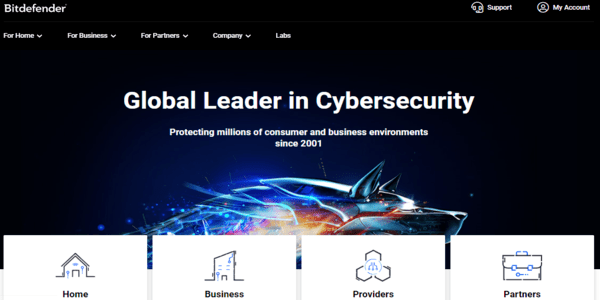
Bitdefender could be the solution you’ve been looking for if you want an excellent antimalware suite for your iPhone.
This software is fantastic with virus detection, but that’s only the beginning. It’s also a complete security suite that will be the joy of many iOS users.
The iOS app scans your network connections and blocks anything that looks fishy. It includes a VPN (200 MB daily). 200 MB is not a lot of data, especially if you want to stream videos. But if you keep your online activity to browsing, it’s enough so that you won’t need to get a premium VPN account besides Bitdefender.
It will also scan your emails for potential breaches, thus informing you about your online status.
Last but not least, the Bitdefender Central platform lets you view the status of every device under the same Bitdefender account. And you can manage the parental control settings from there as well.
Bitdefender is an excellent option, and it’s the most awarded security suite in the iOS environment, which is enough to consider it seriously.
5. Avira
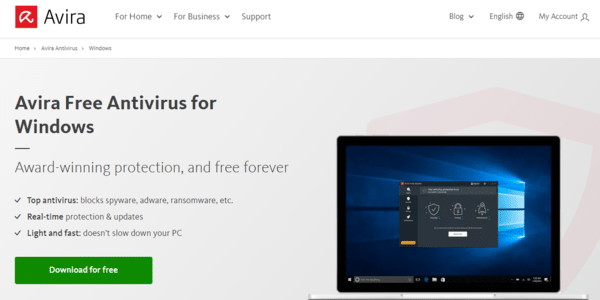
- Download: Avira Mobile Security App Store link
Avira has made a name for protecting Windows, macOS, and Android devices. However, it turns out that the iOS version is equally good. It’s lightweight, it’s complete, and it’s incredible.
Avira has an integrated VPN service that you can use along with the antimalware software –but the data is capped at 100MB daily.
But it has a lot to offer besides the VPN. For instance, it can prevent Siri from logging your Siri commands so that Apple’s servers can’t record your activities. It will also secure your connection when you’re at a public WiFi hotspot and detect other devices using your home network.
Even more, features include automatic software updates for your software, file backup, and help with recovering lost or stolen iOS devices.
But let’s not lose sight of the main thing: Avira is an excellent “antivirus” and antimalware software.
And to top it all off, it’s very cost-effective. A single Avira account lets you secure multiple devices simultaneously to run it on every phone, tablet, and computer.
Our methodology to select the best antivirus for iOS
Let us tell you how we tested and selected the best iOS security apps listed in this article.
The problem with most iOS antivirus apps is that they’re little more than cheaper copies of their Windows brothers and sisters, with the most exciting features stripped down and most of the functionality removed. For example, too many iOS antivirus apps won’t even include real-time protection. That’s a deal-breaker since real-time scans are the main point of antivirus software.
So, we started by eliminating all the apps with no real-time protection against malware. Then, we picked the apps offering the most comprehensive features for iOS users.
But quantity and quality don’t always match. The number of features is only one ingredient in this recipe, so we tried every app to ensure it had at least some authentic potential and see how smoothly it ran.
In this round, we eliminated any app that wasn’t user-friendly and glitch-free (this is software designed to run on Apple’s hardware, for Steve’s sake!).
After that, only a few apps remained. So, we researched their malware detection rates and consulted tests performed by AV-Comparatives.
Once you go through all the data, only a handful of apps survive. The ones in this article.
Installing an antivirus on an iOS system
We’re talking about Apple systems, so the installation process is quick and painless. Just follow these steps:
- Open the App Store. Search for the app you want.
- Download the app onto your device. Open it.
- Accept the app’s license agreement, privacy notice, and terms of use.
- If you have an existing account, log into it. Otherwise, create a new account.
- Finish the app’s setup by following the instructions.
Read also: Best VPN for iPhone
Advantages of iPhone antivirus apps
- Comprehensive security features – While you can install standalone VPNs, safe browsers, and password manager apps, most antiviruses combine these features into a convenient package. This will eliminate the hassle of juggling multiple apps and subscriptions.
- Safe browsing – The antivirus programs on our list will improve your browsing experience by protecting you from malicious websites and phishing threats.
- Peace of mind – Although iPhones have a reputation for solid protection, sometimes you need the comfort that a reliable cybersecurity product offers. The antivirus programs on this list will give you that peace of mind.
Do I need an antivirus security app on my iPhone and other iOS devices?
Yes, you do need one, indeed. Granted, you probably need an antivirus app much less on iOS devices than on Windows or Android, but you will still need it sooner or later.
The information available on this subject is contradictory and all over the place. So, if you run a Google search for “Do I need antivirus software on my iPhone?” you will find every possible answer under the sun.
Many websites swear that iOS devices can’t possibly ever get a virus, so any antivirus tool you can buy or install is a waste of your time, money, and hardware resources. However, on the other side of the spectrum, some websites try to scare you badly enough to download and install an antivirus immediately.
As often happens in the digital world, the truth is never in the extremes.
Granted, the iOS sandbox architecture makes it almost impossible for any virus to do any damage. But that cannot guarantee that you will never face a potentially harmful security threat.
Also, have you “jailbroken” your Apple hardware? If you have, you neutralize Apple’s security policies and mechanisms, so your iPhone or iPad is prone to getting a virus. Why? You did away with the software restrictions imposed by Apple. Those are the very restrictions that previously protected your system from virus infections.
Another threat comes from malware-infested web pages or malvertising. They’re all over the Internet, and you can browse one of them. Even if you use search hits from the Safari search engine, you could end up in one of those — no, not even the famously controlled Safari is 100% safe.
So yes, getting a virus on an iPhone is much rarer than on a Windows or an Android device. But you could still have it happen to you, and if you take no precautions, you’ll make it more likely.
Are there any free antivirus apps for iOS?
Yes, there are many. In fact, all the options listed in this article have a free version, except for Norton360. So, you can easily use one for free to test the app’s feasibility before paying for a subscription.
However, using a free antivirus is something we can’t recommend because of the inherent feature limitations. For example, you’ll often find them lacking real-time protection, which is much-needed, if not critical, even on iOS devices. Since you can’t predict how malware can reach you, securing your iPhone or iPad with a robust paid antivirus is better to keep your worries aside.
Besides, free antivirus apps, especially the free versions of otherwise excellent tools, lack or limit the availability of additional features. That means if you choose a VPN to avail of the other VPN, password management, and device optimization benefits, you won’t get them all without paying.
So, while you can always find a free iPhone antivirus online, you should avoid them.
Paid vs. free antivirus for iOS
Free antivirus software only gives you basic protection against common online security risks. So, you must upgrade to a paid version to access other advanced protection features. For instance, TotalAV’s anti-phishing and unlimited VPN features are only available in the premium version.
Another big difference between paid and free antivirus is the number of devices both versions can cover. In most cases, free versions can only cover one device, while premium versions can protect multiple devices, depending on the antivirus software.
Some comprehensive antiviruses, like Norton, require separate subscription plans to access advanced tools like VPN, password manager, and device optimization tools. So, use paid antivirus software to get the best protection and access to important analysis and monitoring tools.
Threats an antivirus protects you from
An antivirus program on your device protects you against various cyber threats. It may not be a foolproof solution, but it is the first defense line for safeguarding your digital space. Let’s look at the most common threats that antivirus software can protect you against:
Malware
Malware is a broad term that encompasses all types of malicious software, including ransomware, worms, and viruses. In most cases, malware is used to steal data, corrupt/damage the system, or cause harm. An antivirus system helps you with the detection and removal of such threats.
Adware
Adware is less harmful than malware but is quite intrusive. It is a marketing software that downloads and displays annoying ads when your device is connected to the internet. Sometimes, the adware can lead to more serious threats, especially if you don’t have an antivirus.
Botnets
A botnet is a network of ‘hijacked’ computers controlled by attackers. They infect several computer devices with malware to create a network they use to perform malicious attacks. Computers can be in a botnet without your knowledge, but an antivirus can protect you against such attacks.
Keyloggers
Keyloggers are commonly used to steal passwords and credit card information. They are surveillance programs that record your keystrokes when entering confidential data. A good antivirus should be able to detect and remove keyloggers from your device.
Ransomware
Ransomware is malware that holds your files ‘hostage’ and demands a ransom to restore access. They do this by encrypting a part or the entire hard drive and demanding payment to give you a decryption key. Modern antivirus solutions have protection against ransomware.
Rootkits
Rootkits are notorious malware programs that seek to gain the highest authorization for a computer system. They target the core system files to corrupt the system or install other malware. Rootkits are difficult to detect, but most advanced antivirus programs can detect them easily.
Spyware
As the name suggests, spyware is a malicious program that monitors your online activities and gathers information without your consent. They can collect sensitive information about your activities, including financial information, but an antivirus can stop them.
Trojans
Its name comes from the famous Trojan horse. Trojans disguise as legitimate software, tricking unsuspecting users into downloading and installing them. Just like the Trojan horse, they start their malicious activities after installation, but you can detect and stop them with an antivirus.
Viruses
Surprisingly, antivirus software was initially developed to combat viruses. A virus is malicious software that can spread and replicate across a computer network while damaging files. Even today, one of the main objectives of antivirus is to stop viruses.
Worms
Unlike viruses, worms do not need to attach themselves to other programs. They spread copies of themselves from one computer to another, after which they perform malicious activities. However, an up-to-date antivirus can detect and remove worms from your computer system.
Threats an antivirus cannot protect you from
While antiviruses do a great job of protecting you against all the threats we have discussed above, some threats require a different kind of protection. These types of threats require vigilance, awareness, and sound online practices.
Phishing
Phishing is the most common attack for users trying to steal information or gain unauthorized access. Attackers assume a different identity and trick you into revealing sensitive information unknowingly. Some modern antiviruses have phishing protection features, but it is not enough. This is because there are many phishing strategies and tools, most of which involve the user.
Online scams
Like phishing, online scams appear in different forms. Some are fake websites posing as genuine, while others are fraud emails promising huge sums of money. An antivirus can block all known online scam websites, but it cannot prevent you from falling prey to a well-orchestrated online scam. Therefore, you should be vigilant when joining any online program.
Social engineering
An antivirus cannot protect you against social engineering attacks. It involves human interaction where attackers use deception to manipulate you into revealing sensitive information or granting unauthorized access. This can be through physical conversation, phone calls, or emails. Do not be in a hurry to open up to strangers with sensitive information.
Zero-day exploits
Antivirus cannot stop zero-day exploits because they occur even before developers create patches and security updates. Creating a patch and updating the software takes time, so there is no way you can protect yourself against such attacks. The best solution is always to keep an up-to-date version of all your software, including the antivirus.
How to tell your iPhone has a virus
At some point, you’ve worried about your phone having a virus. Perhaps you have used a suspicious Wi-Fi network or clicked on a malicious link. Whatever the case, many symptoms can make you suspect your phone is infected. Here are some of the most common.
- Intrusive ads: The constant appearance of pop-ups may indicate a foreign thing that shouldn’t be there.
- Overheating: If your phone suddenly starts to overheat, it could be a malware infection.
- Draining data: Your phone could have a malware infection if you quickly exhaust your data limit.
- Unknown apps: Verify the apps on your phone are safe, as some could cause a malware infection. Please delete unknown apps.
- Short battery life: Many factors can affect battery life, like screen brightness, usage patterns, etc. Your phone may have a malware infection if the battery drains faster.
You can always install any of our suggestions above if you suspect your iPhone is infected with a virus.
Top antivirus apps that didn’t make the cut
There are other good options in the App Store, but they’re not as good as the five options we picked. Let us tell you which ones and why.
- Lookout: It’s an excellent iOS-specific app. It includes advanced anti-theft features, anti-phishing measures, and identity theft monitoring. So there is nothing wrong with Lookout for sure. But everything it does is available from the other five choices and with better value.
- Phone Guardian: This app is a free VPN that will also encrypt your pictures and personal data. It’s good, as free apps go. But nowhere near as sophisticated and helpful as the elements in my list.
- Avast: It works. But it was also caught in a scandal because it sold its users’ data to big corporations. That’s not what you want from the software to protect your online privacy.
Conclusion
The Apple iOS ecosystem is a bit different from Windows or Android. But, for the most part, Apple is already aware of the most common threats to an iOS system regarding viruses and malware, and it has you covered.
Consequently, high virus detection rates in iOS antivirus apps are not the critical element they can be in, say, Windows. So, the best antivirus providers for Apple mobile systems must give you value in their service by offering extra stuff.
So, the best iOS antivirus apps offer many features, and you need to consider them if you choose wisely. How compatible any given app is with other operating systems or platforms also comes into play.
As the proud owner of an iPhone or an iPad, you could get overconfident because Apple’s reputation for security is outstanding in the industry — although some would say it’s overblown.
But it would be best if you took no risks. Do not forget this: all you need to have your life turned upside down is a single virus. Don’t let that happen. Instead, consider any of the five options in this list.
FAQs
Yes, it can. Downloading infected apps or files is not the only security threat you will face online. Websites can be dangerous, too. That’s why real-time protection on your iPhone or iPad is a good idea.
If there’s an infection on your iPhone or iPad, you’ll notice it in several ways. Unusual battery drainage would be a warning sign. Also, you need to know if your device is jailbroken (more importantly if you bought a used device). And if you notice an app that’s there, that you don’t remember installing yourself, and that wasn’t there from the beginning, your phone could be infected.
Yes. Your iOS includes several excellent security measures, but you can’t configure or deal with them independently as if they were a separate app.
It depends. The answer is affirmative in most scenarios, but you shouldn’t just assume that it will. Check the product’s specifications to know if it will give you the expected features. Remember that some key features could work exclusively on iPhones even if the app works on the iPad.
As explained initially, viruses are not the worst threat that should worry you. Many other online threats can harm you, and you should consider them seriously. An essential feature is real-time protection. It has the disadvantage that you need to pay for it, but it’s critical for your security. Other than that, each security suite offers you a set of similar features. At this point, once you have secured real-time scans, the rest is all about your personal preference. Choose the option that fits better with your digital lifestyle.
No, a good one shouldn’t affect your battery’s charge very much. A virus or a piece of malware, on the other hand, will drain your battery life very quickly indeed.
Not really. But it doesn’t bar you from using an iPhone antivirus, either. Apple boasts top-notch security and privacy on iOS devices, so it doesn’t need to recommend using an antimalware or antivirus app on your iPhone. But you never know how malware may infect your iPhone too. Numerous reports have surfaced online regarding hacking and spying on iPhones. Therefore, keeping your iPhone secured with an antivirus is better, regardless of whether Apple recommends using one.
Yes, free antiviruses from trusted brands are safe to use. However, most free antiviruses have limited features, and you have to upgrade to the paid version to unlock the advanced protection features.
Yes, most iPhone antivirus applications like Avira and McAfee work with all other iOS devices, including iPads. However, you should check the features to determine whether the antivirus offers the intended protection.
